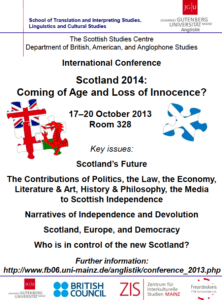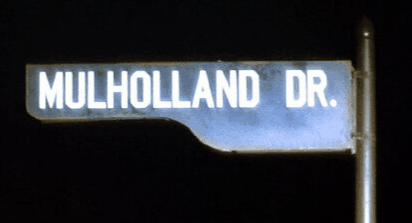I will give a paper entitled No True Scotsman: Neomedivalism and Scottish Cultural Politics
“Scotland 2014: Coming of Age and Loss of Innocence?”
Johannes Gutenberg University Mainz, the English Department in Faculty 06 (Germersheim)

The conference takes place one year before the Scottish referendum on independence and it will investigate the possibilities and prospects Scotland now has. Will it eventually come of age, but also lose its innocence? Connected with this look at the current and possible future situations, the conference will also try to give an account of how Scotland and the ideas of devolution and independence have been dealt with in various media since the Middle Ages. In order to establish a fairly comprehensive understanding of Scotland’s past, present and future, an interdisciplinary approach will be taken and speakers from the fields of politics, cultural policy, history, sociology, economics, media and film studies, cultural studies, literature, art, the law, and the cognitive sciences will be invited.
A cognitive perspective is necessary, as one needs to investigate the mental schemata that have consciously or rather unconsciously been employed whenever devolution and independence have been discussed. How, in fact, have devolution and independence been represented in literature, films, cartoons, the newspapers, on TV, in business or political articles in recent decades as well as in earlier centuries? How dominant is a Scottish perspective in these representations, and how can this perspective actually be defined? Is it really national, or regional, determined by class, wealth, people’s occupation, or in any sense individual? In which ways have the Scottish notions of devolution and independence been influenced by England, Europe, globalisation, the enlightenment, antiquity, romanticism, post-colonialism etc.?
One key question in this context is how the stories of independence and devolution have been narrated. In narratology, mental schemata are again of great importance both for the story’s structure, contents, protagonists etc. and for the genre or medium selected. Are the same stories told at the same time in different media, or do the stories change through the medium employed? What changes in the use of genres and media as well as in the kinds of narrations employed can be detected in representations of Scottish devolution and independence throughout the centuries? Do the new media and media convergence bring about new narratives or new ways of story-telling? Do they in any way tell different stories?
Two other important problems that must be tackled politically, socially, economically, legally as well as intellectually are a) the prospects for the future of Scottish devolution or independence and b) the question of who or what is in control of the shape Scotland adopts for itself. As far as a) is concerned, it has for a very long time been absolutely evident that England (probably Great Britain generally, which means Scotland, too) has defined itself mostly by means of concepts of the past and has, therefore, neglected the present and especially not sufficiently developed plans and ideas for the future. An extended Scottish devolution and above all Scottish independence would make it absolutely necessary for both Scotland and England to develop new plans for their future and with these new ideas also new definitions of their identities. What possibilities for future identities are detectable at the moment, and to what extent are they influenced or even predicted by concepts developed in the past? Do these new possibilities use new forms of narrative and new mental schemata or are they just variations of what human tradition has provided?
Problem b) is vital and for evident reasons extremely topical at the moment. It concerns basic questions of democracy, people’s participation in decisions about the economy, the execution of power, and the shape of the community they live in. It is quite revealing to find challenging descriptions of the current situation in both Great Britain and the United States in books like Charles H. Ferguson, Predator Nation: Corporate Criminals, Political Corruption and the Highjacking of America, New York 2012 as well as Ferdinand Mount, The New Few. A Very British Oligarchy, London 2012. Both see a small elite in power, abusing the economic and political systems for their own profit and dramatically endangering democracy as well as basic humanist values. This is a global phenomenon that must be tackled globally, but also locally. So what is the Scottish position in this context? What are Scottish answers to this problem, and how is the Scottish point of view connected with devolution, independence and new or old forms of narrative and thinking?
Is this now the time for Scotland to eventually grow up and finally leave Neverland? Has the Union allowed Scotland to abstain from responsibility, and does leaving the Union mean becoming a responsible grown-up? The traditional Scottish love of “another land, a rainbow-land, […] the vague Land of Youth, the shadowy land of Heart’s Desire” (Fiona Macleod, The Winged Destiny: Studies in the Spiritual History of the Gael, London 1927, 198) can now indeed either be left behind or turned into a present day reality. But what are the possibilities for this reality? Fortunately, nobody today will repeat Hugh MacDiarmid’s misguided suggestion of 1936 that Scotland’s independence should at least be “on the same footing […] as one of the autonomous republics of the U.S.S.R.” (MacDiarmid, Lucky Poet, London 1972, 145) But are today’s suggestions really more intelligent than this one? Answers are urgently needed. That they are not forthcoming from politics has easily understandable, if deplorable reasons, but where are answers to be found?
The influence of the mass media has increased tremendously, especially in connection with the new media. But what do they offer? The latest animated cartoon Brave by the world’s most successful producer of this medium, Pixar, is a typical example and an indicator of what has happened here again and again, namely a rehash of traditional ideas and well-known concepts. There is nothing new but the technology employed, used for very common effects and narratives. If new concepts and new forms of thinking and narrating are not being presented, perhaps a return to the stupendous tradition of human ideas, often simply forgotten, might be very useful now, a tradition to which Scotland, of course, has contributed considerably, and not only during the Scottish Enlightenment.
The conference thus intends to define past and present conceptions of devolution and independence in large contexts, but will also try to develop ideas about the future of Scotland, Europe and the democratic world. We’d be pleased to hear your ideas and suggestions for this event which will take place at Mainz University in its Faculty 06 in Germersheim. Alex Salmond said in early September 2012 that the 2014 referendum should be on 18 October 2014. Our conference will, therefore, examine the situation exactly one year earlier and analyse, describe, and discuss it from Thursday 17 to Sunday 20 October 2013, with an opening ceremony on Wednesday 16 October at 6.30pm.


